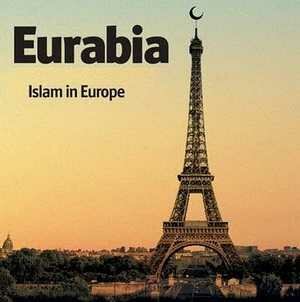
The European society actively discusses Islamic parties' enhancing participation in the political life of Europe. It is important to note that in this publication we are talking first of all about “moderate” Islamic parties of traditional orientation. Having before their eyes the example of successful various Christian Democratic parties of Old Europe, relatively young Islamic parties also tend to take their place in the general democratic process of European policy. After all, in Europe is growing influence of radical Islamist movements that conduct active propaganda, accept European youth into Islam, recruit mercenaries to take part in the fighting in Syria and Iraq in the ranks of the Islamic State. However, this topic is deeply and broadly disclosed on the website of the Analytical Center “Borysfen Intel” in a series of publications: “Islam: The Way to the Light or the Road into the Darkness of the Middle Ages?”
http://bintel.com.ua/en/article/islam/
| Photo: http://gordonua.com |
Muslims of Europe. Islam today is the second largest religion in Europe, and by the growth rate of the number of faithful Muslims it is well ahead of Christian Europeans. There are about 24 million Muslims in Europe today, and some predict their numbers could double in the next 15 years (including at the expense of labor immigration and a high birth rate in Muslim families). Along with the growth of Muslim diasporas in Europe, their role and impact on the socio-political processes in Europe keep growing too.
|
|
More and more often Muslims are in the focus of public attention of indigenous Europeans. This happens after Islamists' another terrorist attack and because of continued debates on the hijab, construction of new mosques and minarets, studying Islam and the Arabic language, radicalization of youth in Muslim blocks of houses, Sharia “patrols” and so on. There are constant debates on feasibility of Turkey's membership in the European Union, construction of a multicultural society, effectiveness of management of immigration flows, and most importantly — on Europeans' attitude to Islam as a whole.
Indigenous Europeans get more and more concerned with the very fact of having immigrants of Muslim origin. The Muslim population's “numerousness” is alarming, its rapid growth as a result of immigration and a high birth rate, high government spending on social programs to support migrants, unusual for Europeans adherence to the traditions of Islam, relevant rites, rules of conduct and of life, the reluctance of many Muslim immigrants from the Middle East and Maghreb to assimilate into European society and their unwillingness to learn the language of the host country, and so on. After September 11, 2001, migrants (that previously had been treated exclusively as a temporary labor force) are increasingly perceived as a threat to national security. Muslim origin of some members of resonance terrorist attacks has led to widespread of xenophobic and Islamophobic sentiments in the European society.
Extremely significant is an example of the Czech Republic, where there are less than 0.1 % of Muslims. At this, according to recent opinion polls — about 87 % of Czech citizens support the introduction of harder rules of entry for representatives of Muslim countries, and two-thirds of Czechs express their concerns about Islam.
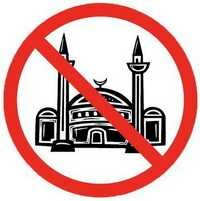 Obvious failure of the policy of Muslim population's integration into the secular European society leads to an aggravation of relations between the indigenous population of European countries and immigrants, growth of Europeans' anti-immigrant sentiments and mass protests against the “liberal” migration policy of national governments. In response to the demands of the indigenous majority of Europeans, national authorities introduce more discriminatory restrictions against the Muslim population. Here we should mention massive bans on women's wearing traditional Muslim attire (burqa, niqab, hijab and purdah) in public places (France — in 2004 and 2011, Belgium — 2011, the Federal Land of Hessen in Germany — 2011, the Netherlands — 2012, the canton Ticino in Switzerland — 2013). In Italy, a similar law was passed in 1975. Similar bans are planned to be considered by the Parliaments of Austria and Spain. In Switzerland, following a referendum in November 2009, has been introduced a ban on construction of new mosques.
Obvious failure of the policy of Muslim population's integration into the secular European society leads to an aggravation of relations between the indigenous population of European countries and immigrants, growth of Europeans' anti-immigrant sentiments and mass protests against the “liberal” migration policy of national governments. In response to the demands of the indigenous majority of Europeans, national authorities introduce more discriminatory restrictions against the Muslim population. Here we should mention massive bans on women's wearing traditional Muslim attire (burqa, niqab, hijab and purdah) in public places (France — in 2004 and 2011, Belgium — 2011, the Federal Land of Hessen in Germany — 2011, the Netherlands — 2012, the canton Ticino in Switzerland — 2013). In Italy, a similar law was passed in 1975. Similar bans are planned to be considered by the Parliaments of Austria and Spain. In Switzerland, following a referendum in November 2009, has been introduced a ban on construction of new mosques.
|
|
The concept of “tolerance” towards Islam, as a religion, and to Muslim migrants as “partners-neighbors” — so characteristic and going without saying for the Ukrainian society is becoming increasingly strange to European nations. Last January's Islamists' attacks in Paris and Europeans' reaction to them have exacerbated these problems. At this, European leaders' mantras about unity in the struggle against “terrorism, not against Islam,” cannot snuff out the growing Islamophobia and racial intolerance in the European society.
One catalyst for this trend is the lack of a single, coordinated program of European governments towards Islam. A program to prevent not the spread of Islam as such, but of its radical manifestations — radical Islamism.
In these circumstances, the need to defend their own interests and resolve the pressing social and economic issues, makes European Muslims activate their participation in political processes. Muslims become members of political parties, are elected to the City Council, to nominate candidates to the parliaments of all levels (from local to European), participate in the work of Islamic organizations and associations, create new socio-political Islamic movements and parties.
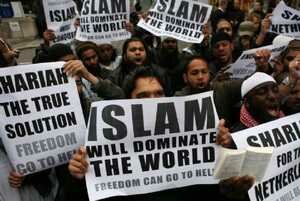 Political Activity of European Muslims. Political leaders of Muslim origin are still under-represented in European politics. They are few among members of the European Parliament, but are more numerous at the national level, even more — at local (municipal and regional) levels. At this, in European countries with numerous Muslim populations (France, Germany, Great Britain, the Netherlands and Belgium), the degree of their participation in the political process is growing steadily.
Political Activity of European Muslims. Political leaders of Muslim origin are still under-represented in European politics. They are few among members of the European Parliament, but are more numerous at the national level, even more — at local (municipal and regional) levels. At this, in European countries with numerous Muslim populations (France, Germany, Great Britain, the Netherlands and Belgium), the degree of their participation in the political process is growing steadily.
Mainly Muslim candidates are put forward as part of traditional European political parties. They try not to focus attention on their ethnicity or religion, as it may deter the non-Muslim majority of voters (native Europeans) and the Muslim minority (because of religious and national-ethnic differences).
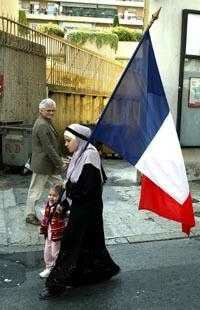 Muslims' attitudes to political processes in different countries also differ. For example, in France the majority of Muslims are immigrants from North Africa. They are characterized by the traditional political indifference, skepticism and distrust to the electoral process. Accordingly, the French Muslims' activity at elections and degree of representation in the political life of the country is extremely low. On the contrary, the majority of Muslims in Germany are from secular Turkey, a country with almost democratic institutions. Therefore, German Muslims are very active in elections at all levels. Their representatives held several positions in both, government bodies and in German political parties.
Muslims' attitudes to political processes in different countries also differ. For example, in France the majority of Muslims are immigrants from North Africa. They are characterized by the traditional political indifference, skepticism and distrust to the electoral process. Accordingly, the French Muslims' activity at elections and degree of representation in the political life of the country is extremely low. On the contrary, the majority of Muslims in Germany are from secular Turkey, a country with almost democratic institutions. Therefore, German Muslims are very active in elections at all levels. Their representatives held several positions in both, government bodies and in German political parties.
European Muslims traditionally defend their interests through regional or ethnic Islamic social movements and associations, as well as through the existing European national or regional political parties. The general tendency of European politics is a very low percentage of Muslims among the members of traditional political parties.
|
|
In general, the majority of European Muslims supports left-wing parties with their liberal rhetoric on social security, migration and intercultural policies. However, the growing anti-Islamic sentiment in Europe has forced both, governments and leftist party movements be careful about supporting Muslim diasporas, making Muslims create their own political parties.
Islamic parties in Europe. The growing social and political activity and desire of Muslims to protect their interests have caused the trend of increasing the number of Islamic political movements and parties in Europe. The number of political parties representing the interests of Muslims is not very large. But, with the increase in the Muslim population, their role in the political life of Europe will increase, and processes of establishing their own political parties will get activated.
As of today, there are the following Islamic political parties in Europe:
-
 in Spain — “Renaissance and Union of Spain Party” (Partido Renacimiento y Unión España, PRUNE), registered in Granada in 2009. It calls for moral and ethic revival of the society based on the principles of Islam. The party is actively sponsored by the Government of Morocco. Back in 2011 was planned participation of the party in municipal elections in several regions, but it has never been represented in voting papers. In May 2015 the party is going to participate in municipal elections in Malaga, Madrid, Barcelona, Murcia, Valencia, Oviedo and Toledo.
in Spain — “Renaissance and Union of Spain Party” (Partido Renacimiento y Unión España, PRUNE), registered in Granada in 2009. It calls for moral and ethic revival of the society based on the principles of Islam. The party is actively sponsored by the Government of Morocco. Back in 2011 was planned participation of the party in municipal elections in several regions, but it has never been represented in voting papers. In May 2015 the party is going to participate in municipal elections in Malaga, Madrid, Barcelona, Murcia, Valencia, Oviedo and Toledo. -
 in the Netherlands — “Islam Democrats” (Islam-Democraten). Founded in 2005, the party is in favor of struggle against religious discrimination, increase of the number of Muslim schools, for studying the Arabic language. Since 2006, the party has been involved in municipal elections in The Hague, where its representatives hold several seats in the City Council. In early 2015 two politicians of Turkish origin, expelled from the Dutch Labour Party, created a new Muslim party “Denk” (Think), with the main objective — to strengthen the struggle against racism and discrimination in the Dutch society.
in the Netherlands — “Islam Democrats” (Islam-Democraten). Founded in 2005, the party is in favor of struggle against religious discrimination, increase of the number of Muslim schools, for studying the Arabic language. Since 2006, the party has been involved in municipal elections in The Hague, where its representatives hold several seats in the City Council. In early 2015 two politicians of Turkish origin, expelled from the Dutch Labour Party, created a new Muslim party “Denk” (Think), with the main objective — to strengthen the struggle against racism and discrimination in the Dutch society. -

 in Belgium — “Islam Party”. Established in 2012, the party by results of the local elections in October 2012 received one seat in each Council of the Brussels communes of Anderlecht and Molenbeek-Saint-Jean. In May 2014 the party unsuccessfully participated in federal and regional elections, and received 13.7 thousand votes (0.2 %). The Arab League of Europe (which also operates in the Netherlands) has formed a coalition party “Resist” to participate in the 2003 parliamentary elections and the “Muslim Democratic Party” (Moslim Democratische Partij) for local elections in 2004. Both projects were unsuccessful and its representatives did not gain enough votes. The “Movement of Young Muslims” (Mouvement des Jeunes Musulmans, MJM) has created its own political party, but also to no avail. Besides, two Islamic parties participated in the elections of 2003 in Brussels — NOOR (later the “Islam Party”) and the Party of Citizenship and Prosperity (PCP, Parti Citoyenneté et Prospérité). Defending radical Islam, the PCP won in those elections about 8 thousand votes, but soon fell apart because of problems with the leadership.
in Belgium — “Islam Party”. Established in 2012, the party by results of the local elections in October 2012 received one seat in each Council of the Brussels communes of Anderlecht and Molenbeek-Saint-Jean. In May 2014 the party unsuccessfully participated in federal and regional elections, and received 13.7 thousand votes (0.2 %). The Arab League of Europe (which also operates in the Netherlands) has formed a coalition party “Resist” to participate in the 2003 parliamentary elections and the “Muslim Democratic Party” (Moslim Democratische Partij) for local elections in 2004. Both projects were unsuccessful and its representatives did not gain enough votes. The “Movement of Young Muslims” (Mouvement des Jeunes Musulmans, MJM) has created its own political party, but also to no avail. Besides, two Islamic parties participated in the elections of 2003 in Brussels — NOOR (later the “Islam Party”) and the Party of Citizenship and Prosperity (PCP, Parti Citoyenneté et Prospérité). Defending radical Islam, the PCP won in those elections about 8 thousand votes, but soon fell apart because of problems with the leadership. -
 in Germany — “Alliance for Peace and Justice” (Bündnis für Frieden und Fairness, BFF). In the elections in August 2009, in North Rhine-Westphalia this Muslim Party managed to achieve a positive result, and it was presented in the municipal assembly.
in Germany — “Alliance for Peace and Justice” (Bündnis für Frieden und Fairness, BFF). In the elections in August 2009, in North Rhine-Westphalia this Muslim Party managed to achieve a positive result, and it was presented in the municipal assembly. -
 in France — “The Union of French Muslim Democrats” (L'Union des démocrates musulmans de France, UDMF). On approaching at the end of March this year, regional legislative elections for a number of French departments, this party nominates several candidates. Founded in November 2012, the UDMF has about 600 active members. This is not the first Islamic party in France. Similar but unsuccessful attempts were made in the country in 1997 and 2009.
in France — “The Union of French Muslim Democrats” (L'Union des démocrates musulmans de France, UDMF). On approaching at the end of March this year, regional legislative elections for a number of French departments, this party nominates several candidates. Founded in November 2012, the UDMF has about 600 active members. This is not the first Islamic party in France. Similar but unsuccessful attempts were made in the country in 1997 and 2009. - in Sweden — Muslim party “Political Islamic Union” (Politisk Islamisk Samling, PIS). Formed in 1999, the organization with strictly political goals is today only a formal political formation for Muslims.
-
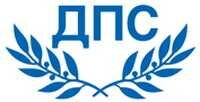 in Bulgaria, having about 13 % of the Turkish ethnic minority, in 1990 was founded the party “Movement for Rights and Freedoms” (MRF). It is the only exception to the general rule of formation and development of European Islamic parties, as it is first of all a Turkish “ethnic” party. Today the party “MRF” is represented both, in the national and in the European Parliaments.
in Bulgaria, having about 13 % of the Turkish ethnic minority, in 1990 was founded the party “Movement for Rights and Freedoms” (MRF). It is the only exception to the general rule of formation and development of European Islamic parties, as it is first of all a Turkish “ethnic” party. Today the party “MRF” is represented both, in the national and in the European Parliaments. -
 in the United Kingdom — in 1989-2006 had been acting the “Islamic Party of Britain”, created for participation in parliamentary elections. However, in the elections in 1990 and 1992 the party's efforts were unsuccessful. The party with the program slogan “Towards a better future with Islam” was aiming at empowering of the Islamic religion with the same rights and privileges as those of the Church of England.
in the United Kingdom — in 1989-2006 had been acting the “Islamic Party of Britain”, created for participation in parliamentary elections. However, in the elections in 1990 and 1992 the party's efforts were unsuccessful. The party with the program slogan “Towards a better future with Islam” was aiming at empowering of the Islamic religion with the same rights and privileges as those of the Church of England. - in Norway — in 2009 was formed the “Contemporary Party” (Samtidspartiet). Established by the man from Pakistan, it claimed the right to represent interests of all Muslims in Norway. In the parliamentary elections of 2009 in the county of Oslo the Party received 264 votes (less than 0.01 %).
Besides, at the present time, some European social movements and associations are seeking the right to obtain the status of political parties:
-
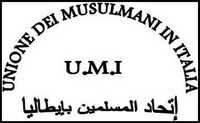 in Italy — “The Union of Italian Muslims” (Unione dei Musulmani in Italia, L'UMI). Founded by Moroccan religious leaders in 2007 in Turin, the Union aims to create a Muslim political party. The eponymous small Union L'Unione Musulmani d'Italia (UMI), created by the notorious Adel Smith in 2001, has always positioned itself as a political party. After the death of its founder in August 2014, this Union has no future. Another organization representing interests of Muslims in Italy is the “Union of Islamic Associations and Organizations” (Unione delle Comunita e delle Orhanizzazioni Islamiche in Italia, UCOII). The organization headquartered in Rome, was founded in 1990 on the basis of the older Association of Muslim students in Italy (USMI). Officially, this union is not a political party, but is the center of many Muslim organizations in Italy.
in Italy — “The Union of Italian Muslims” (Unione dei Musulmani in Italia, L'UMI). Founded by Moroccan religious leaders in 2007 in Turin, the Union aims to create a Muslim political party. The eponymous small Union L'Unione Musulmani d'Italia (UMI), created by the notorious Adel Smith in 2001, has always positioned itself as a political party. After the death of its founder in August 2014, this Union has no future. Another organization representing interests of Muslims in Italy is the “Union of Islamic Associations and Organizations” (Unione delle Comunita e delle Orhanizzazioni Islamiche in Italia, UCOII). The organization headquartered in Rome, was founded in 1990 on the basis of the older Association of Muslim students in Italy (USMI). Officially, this union is not a political party, but is the center of many Muslim organizations in Italy. -
 in Finland — “The Finnish Islamic Party” (Suomen Islamilainen Puolue). This political association was founded back in 2007, but did not get enough votes to get official registration.
in Finland — “The Finnish Islamic Party” (Suomen Islamilainen Puolue). This political association was founded back in 2007, but did not get enough votes to get official registration.
All of the above-mentioned political forces cannot be called large or influential, although the number of their supporters will steadily grow. However, a common deterrent to the development of all of these parties (with the exception of ethnic Turkish “MRF” from Bulgaria) is the problem of political association due to religious and national-ethnic differences. After all, potential electorate to such parties is ethnic Arabs from North Africa or the Middle East, black Muslims from West and Central Africa, people from Turkey, Pakistan and India. Each of these diasporas has its own traditions, way of life, and behavior, stick to different directions and trends in Islam. At this, dominance of one of these ethnic groups in the community at the local level is common practice. Contradictions between different diasporas and mutual non-perceiving between them lead to the fact that attempts to form a kind of all-encompassing Islamic party in the majority end in failure.
Another trend is the lack in the European policy of purely Muslim ethnic parties representing interests of specific ethnic groups outside the regions of their compact residence.
Conclusions and Forecasts. The role and influence of Islamic political parties in the political life of European countries will undoubtedly grow. In the first place-at the regional and local levels. Attempts to organize Muslims through all-European or state organizations continue to be unsuccessful so far, due to ethnic and religious differences. It can be assumed that not finding its place in general political processes, the radical Muslim youth will seek answers not only in Islamic extremism or terrorism but mainly in street protests and general-criminal activity.
To prevent such trends, relevant European institutions and individual European countries activate implementation of programs for integration of Muslim minorities. Along with this, efforts will be intensified to get “moderate” Muslims involved in general political and electoral processes within the framework of traditional political parties.
Europeans' main task of integrating immigrants, however, is unlikely to provide for significant concessions to them.
On the contrary, the inevitable further tightening of immigration policy at the level of individual states and the EU will only intensify the antagonism between Muslims and indigenous Europeans.
|
|
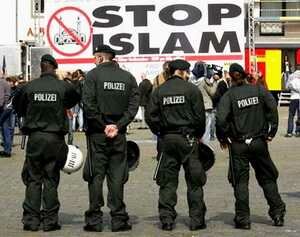 In turn, the growth of anti-Islamic sentiments in European society will strengthen popularity of ultra-nationalist parties in European countries. This is already seen in the increase in representation of such forces at both, local and national levels (e.g., “SYRIZA” in Greece), and at the level of the European Parliament (the French “National Front”). The latest (May 2014) European Parliament elections convincingly confirmed the popularity of various kinds of ultra-nationalist and separatist parties, who got about 14.4 % of the vote.
In turn, the growth of anti-Islamic sentiments in European society will strengthen popularity of ultra-nationalist parties in European countries. This is already seen in the increase in representation of such forces at both, local and national levels (e.g., “SYRIZA” in Greece), and at the level of the European Parliament (the French “National Front”). The latest (May 2014) European Parliament elections convincingly confirmed the popularity of various kinds of ultra-nationalist and separatist parties, who got about 14.4 % of the vote.
The growth of nationalist and Eurosceptic sentiments in the European society, in its turn, may lead to changes in party-political processes in European countries and in the EU's policy as a whole (including enlargement). Caused by these processes centrifugal tendencies at the European level are unlikely to strengthen European integration prospects. On the contrary, the threat of activation of disintegration processes among Europeans will lead to narrowing of the timing of Ukraine's joining the policy of “open doors” of the European Union.
This situation once again raises the question of acceleration of Ukrainian national reforms aimed at the European perspective, urgency and vital importance of which is not just obvious, but (so far) today is in great demand in the Ukrainian society.

